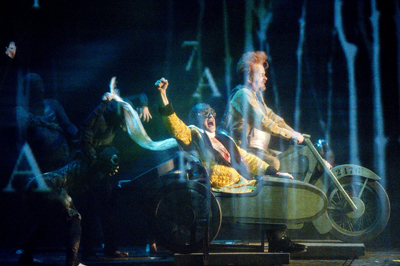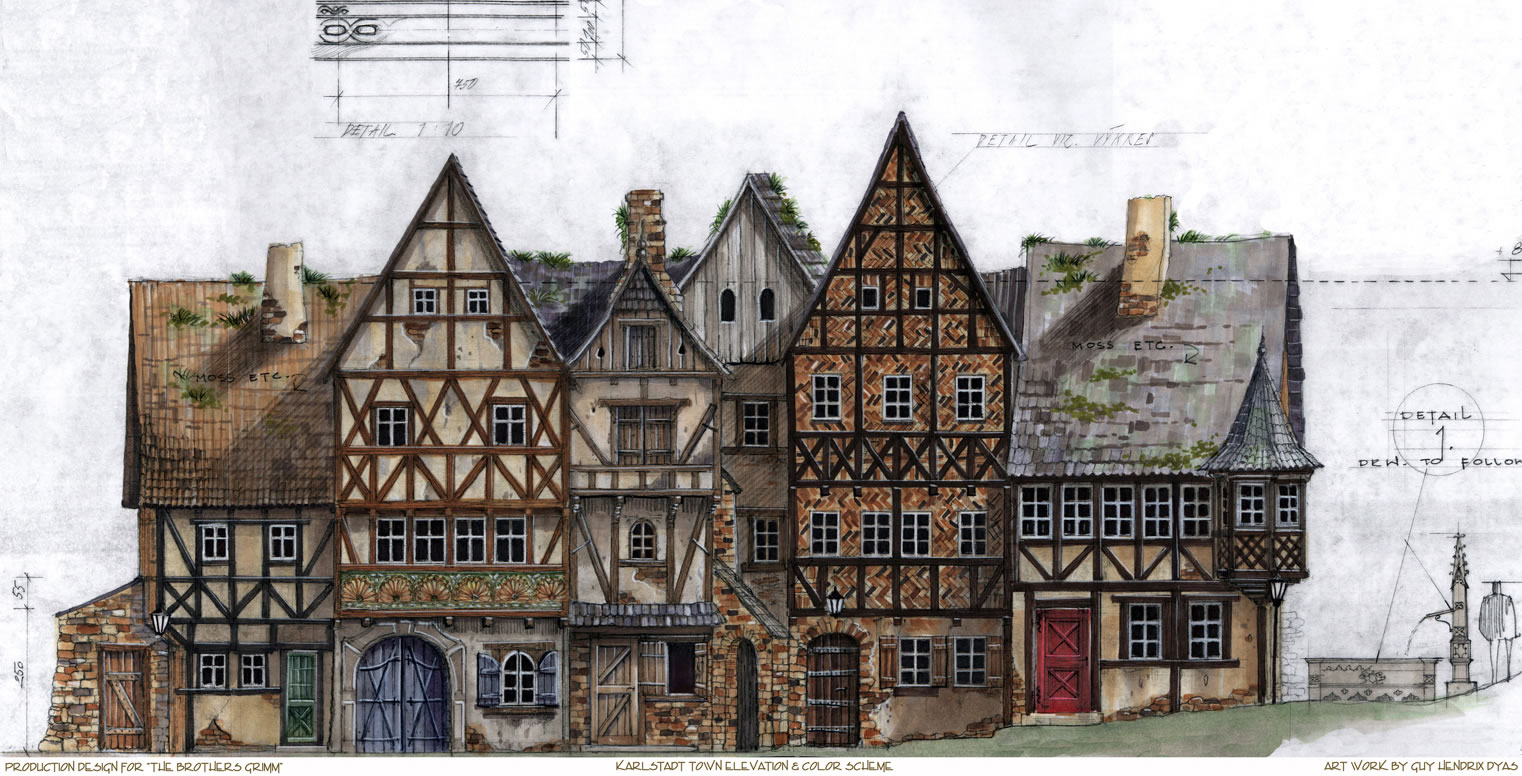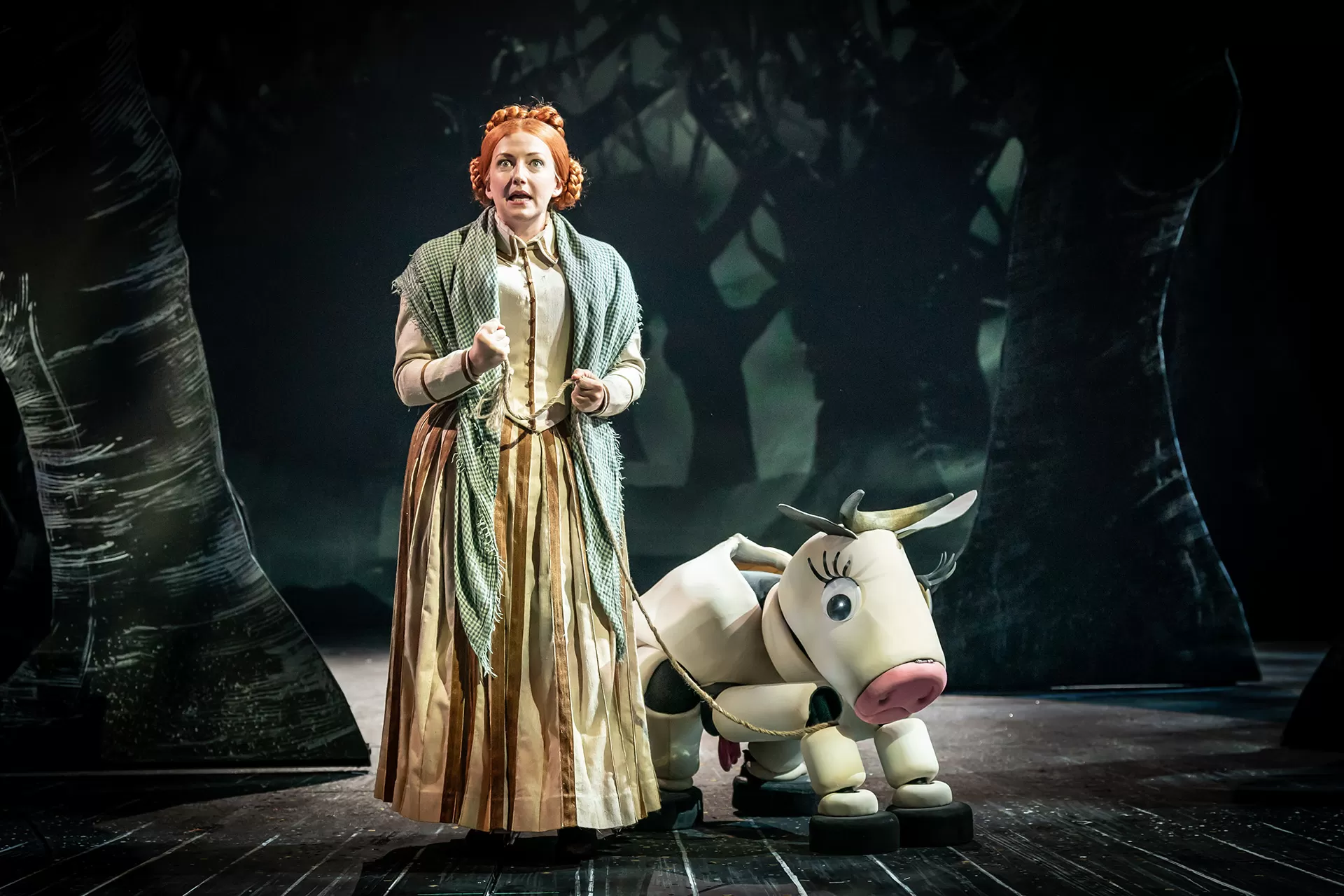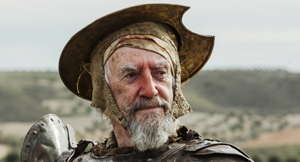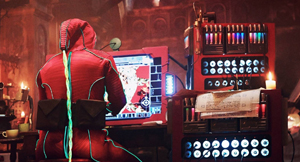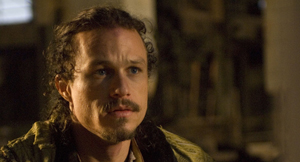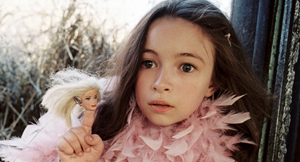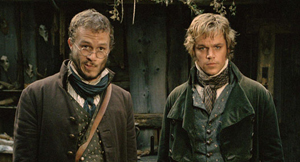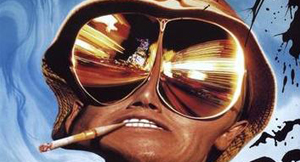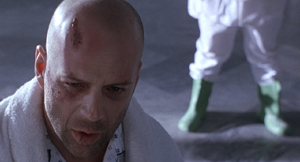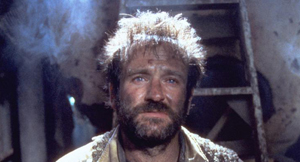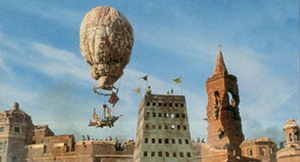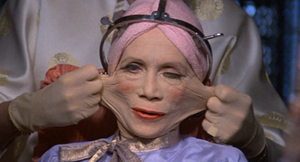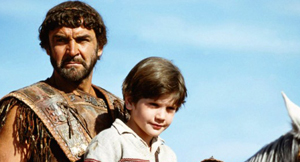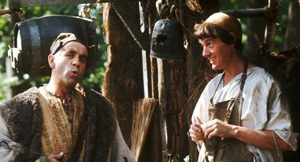written for Dreams by John Ashbrook

And so, The Dark Ages have ground to a halt and Jabberwocky, Terry Gilliam’s long-forgotten first-born film, is finally given the treatment it so patently deserves. Inspired by this Renaissance in good sense, I decided to lever open the pages of my aged, crumbling copy of the ‘Jabberwocky’ novelisation and found it to be that rarest and most precious of commodities – a novelisation which is far more than a pale imitation of the film.
The author, Ralph Hoover, has a vicious streak of dark, sarcastic humour in his prose which, I suspect, pleased Gilliam immensely. Also, in keeping with Gilliam’s general approach to his own subjects, Hoover is delightfully disrespectful of the film’s text, wandering off at tangents, adding things, changing things and generally making stuff up as he saw fit.
It turns out, he even made up his name. Inspired by the book, I decided to follow Wat Dabney’s lead and put my best foot forward. With a modicum of leg work, I discovered that Ralph Hoover is, in fact, a pseudonym – of one Paul Spike.
Paul was good enough to respond to a few unsolicited e-mails, and here are his recollections, dredged up through a quarter of a century of silt, and presented for your edification.

So, Paul, here’s what little I think I know about you so far: You’re an American born in 1947. You wrote the following comic novels as Paul Spike: Bad News (New York, Holt, Rinehart & Winston, 1971) Photographs of my Father (New York, Knopf, 1973) The Night Letter (New York, Putnam, 1979; London, Granada, 1979) Last Rites (New York, New American Library, 1981; London, Granada, 1982). You appear to have lived in England and worked for Vogue and The Independent (who forwarded my letter to you, which was very nice of them).
You have my correct birthdate and books. As for the latter, only my first – Bad News – was comic. It was a collection of short stories, much of it what was called at the time ‘experimental fiction’ and which I had written and published in various little magazines while an undergraduate at Columbia in NYC. One of the stories won the Paris Review Humour Prize back in 1969. The book had a generous dust jacket quote from William Burroughs: “I have read Bad News and consider it at once a beautiful and disquieting book, in which seemingly commonplace happenings suddenly open into other planetary perspectives.”
I haven’t published a book or any fiction for some years now, although I am currently working on several long-term projects. What I have been doing is mostly journalism. I wrote extensively for GQ and Vogue magazines in the late ’80s and ’90s, and was a Contributing Editor of both (I still am on the Vogue masthead). I’ve also written for most of the major newspapers in the UK.
I was also Vogue’s restaurant critic for 8 years. I spent six months as Editor of Punch back in ’97, when I re-re-launched it for al Fayed, after his first disastrous re-launch. After Punch, I spent a year as Diary Editor of the Independent, where I launched the Pandora column.
How far would you say that Jabberwocky fits in with your other works? Since you make the Middle Ages quite so grim, filthy, and cruel (far more-so than the film) I wonder if you’re ‘legit’ books are as dark. After all, anyone who can ‘disquiet’ William Burroughs with a comic novel …
I think Jabberwocky’s ‘dark side’ would not shock anyone who had read my other books: a collection of fairly nihilistic short stories; a memoir about growing up in the 60s and the murder of my father, who was a civil rights leader; and two thrillers.
Let’s fill in some of the background: How did you come to write Jabberwocky?
I first heard about Jabberwocky from my agent back in 1976, not too long after I first moved to London following some years living in Deia, Amsterdam, Paris and Istanbul. I needed some cash and he had been offered this project to turn the screenplay into a ‘novelisation’ and was looking for a writer. They sent me the screenplay – it was about to be shot – and I met with producer Sandy Lieberson and Terry Gilliam. Terry said I was free to do whatever I wanted with it, just so long as it followed the basic plot line and characters. I wrote it over a period of a few weeks and took a number of outrageous liberties, as a novel requires a lot more words than a screenplay provides.
Why the pseudonym?
I chose to use a pseudonym because back in the Seventies, ‘novelisations’ were still a slightly suspect genre with publishers and I wasn’t sure that it was wise to put my real name on one.
Why did you chose that particular pseudonym, does it have any great personal significance?
It was a name I had used occasionally prior to 1976, usually for minor bits of journalism.
In the book, you have taken a lot of wonderfully off-the-wall liberties with the film we now have; I’m wondering how much of a free hand you were given?
At one point, near the end of my writing, Terry asked me down to the set at Shepperton (I think that’s where it was being shot) and I hung around for a few hours with Terry, Michael Palin and Terry Jones. We got on well and Terry confessed that he was feeling a bit anxious as, during the shooting and watching the rushes, they were becoming aware that the film was going to have a younger audience than they had originally foreseen. “It looks like this may be a kids movie!” Terry confessed.
After I finished the draft, my agent sent it to Terry and Sandy and they approved it without any substantial revisions. Some months later there was a big screening, held early in the morning in Leicester Square, to which I was invited along with any children I might have. I didn’t yet have kids at the time, so brought a friend’s son. I enjoyed the film – as did most of the other kids in the audience.
Not too long after that, the book came out in a Pan paperback edition. I got a call one day saying there was a signing party for the book at the Pan Bookshop on Fulham Road later that afternoon and I could attend if I wanted, so I went along. The Python crew were already there, signing the book when I turned up and I recall they were very gracious, insisting that people get me to sign it as well, since I was ‘Ralph Hoover’.
So, are there copies out there with Paul Spike’s autograph on them, or Ralph Hoover’s?
Oh, I definitely recall signing a few copies as Ralph!
Given your cosmopolitan life in the early-mid seventies, were you even aware of Monty Python’s Flying Circus and, therefore, Terry Gilliam? I don’t know about Europe, but I gather it didn’t start showing in the States until 1974.
I don’t think I had seen any Python shows until I moved to London in January 1976, where we didn’t know that many people and did watch a lot of telly. I thought it was great, but I am not sure how much influence seeing Python had on my writing of the novelisation, except in the sense that I felt comfortable to ‘let it fly’ in whatever style felt right and funny.
And now the most unfair question I’ve yet asked: What do you actually think of the film, and how well do you think your novel compares?
As for the film, I saw it again recently on television and enjoyed it. It’s silly and childish, sure, less surreal than most Python sketches or later Gilliam films, but it’s still fresh and funny – at least for me – and has no doubt influenced a lot of the more sophisticated films that have been made since. The book is darker, yes, and was written ‘in the dark’ as it were, alone and away from the set most of the time, using the script to spark off my own rather cynical Dark Age fantasies.
I was living in Belsize Park in those days and used to have the same bank as Palin on England’s Lane. I ran into him there one day and he told me – as generous as he was satirical – that he thought my book might have been better than the actual film. Time has certainly proved, to me at least, how untrue that remark was.
In any case, it was a laugh and it brought me some cash at a time when I certainly needed it. I occasionally run into Terry at parties or in the Groucho Club. I suppose if I ever write another novelisation I will keep the ‘Ralph Hoover’ tag, as I think it would be pleasing to see Ralph’s literary renaissance in the 21st century.
So, if you wander into your local branch of ‘Aged Tomes R Us’, lift aside that dusty old Guttenberg Bible, or something equally inconsequential, and spot a copy of the ‘Jabberwocky’ novelisation hidden beneath, snap that sucker up. It’s the funniest thing since the Great Fire of London.
(John Ashbrook’s PocketEssential book on Terry Gilliam is available in all good bookshops)


